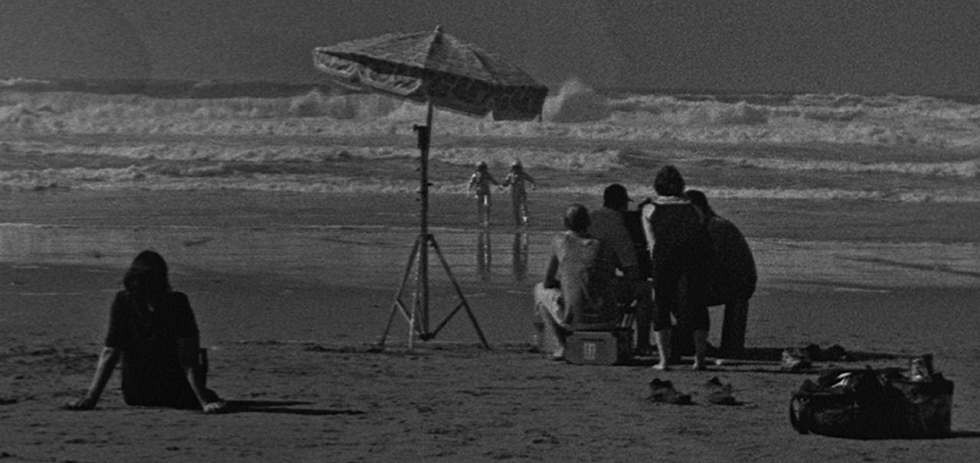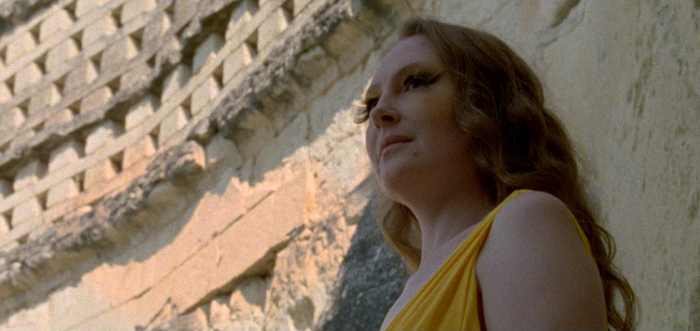One of the most striking programming decisions in this year’s installment of the Queensland Film Festival is its commitment to short film and medium-length cinema. With regards to the latter, the festival screened Sector IX B and paired Bring Me the Head of Tim Horton with Ennui Ennui—two medium-length works that, programmed together, reflect the festival’s commitment to screening the oft-ignored. As John Edmond put it in our interview with him, “the medium-length film of that thirty-to-fifty mark is a death zone.”
Short film, though, seems to be flourishing at Queensland Film Festival. Fourteen shorts screened in total (with one special screening yet to come), over a third of them in local retrospective program Remembering BFF. We have surveyed films in the remaining ten, fascinating and often daring works of short form cinema.
Dominic Barlow: It’s been a tragically long time between Lucile Hadžihalilović’s 2004 feature Innocence, a surreal tale set in a girls’ boarding school, and her latest longform work, Evolution, which shifts to a community of young boys and their maternal figures, and was the highlight of Sydney Film Festival’s Freak Me Out sidebar this year. We may not have needed to wait quite that long after all, because 2014 saw her write and direct Nectar, a short film that bridges the thematic gap in her unmistakeable style, and which only now debuts in Australia thanks to Queensland Film Festival. The Guardian quotes Hadžihalilović as saying that “Innocence was about puberty; Nectar is more about the menopause,” and it’s not a reach by any means. It fixates on the body of a mature woman (Olga Riazanova); a yellow-fingernailed, bold-eyelashed matriarch being massaged and dressed in honey by her loyal subjects, like she were being embalmed for a funeral. In the interior of a bedroom, her naked corporeal form is placed under the same pall of de-eroticised eerieness that Hadžihalilović is known for.
It’s not so simple as to say that infertility equals death, however. In other scenes, this so-called Queen of Bees roams forest glens in a flowing garment, tends to a literal bee colony and sates a man lusting for her through the hole of a brick wall. This sequence unfolds in daylit 16mm photography, placing her as a luminous figure of authority and the overseer for the ambiguous happenings and impulses of nature. This isn’t confined to an animalistic metaphor, either—a lengthy scene places a copulating couple against the bulbous, hive-like architecture of the estate building outside their window. By framing their intimacy with the modern form of human colonisation, it strikes a parallel between both species and readies the notion of humans as hive-minded tribes, which is immediately explored to chilling effect in Evolution thanks to Queensland Film Festival’s program. Flesh is plucked and pulled from arid surroundings, then moulded to suit an unknowable world order, and Hadžihalilović is a master at playing this out in forms most fearsome.
Fear also plays a heavy role in Neither God Nor Santa Maria, the experimental short preceding Ben Rivers’ The Sky Trembles and the Earth is Afraid and the Two Eyes Are Not Brothers, but co-directors Samuel M. Delgado and Helena Girón have a much wryer outlook. Through the 1960s recordings of Luis Diego Cuscoy, male voices invoke legends of malevolent witchcraft and seduction, set against the mists of the Island of Lanzarote; good enough for a staging of Macbeth. Yet, when women—real, elderly women of Lanzarote—appear onscreen, they are as far away from the sort as you can imagine. They busy themselves in peaceful silence, yet the expired 16mm negative provides bold scratches across the frame, as though a storm’s lightning bolts had been hastily texta’d in. This juxtaposition of audio recordings and footage sucks the gravitas right out of the former; the men’s folktales are just that, yet they deliver them with such enthusiasm. They are figuratively drawing the lightning bolts and imposing their suspicions onto the most mundane activities (garden-tending, applying make-up, sleeping), and judging by the snatches of laughter among the women towards the end, the humour in their scaremongering isn’t lost on anyone.
Similarly revelling in the cold remove of the Earth is Laurent Grasso’s 9-minute piece On Air, which assembles static desert landscapes of the United Arab Emirates with the footage from a camera attached to a falcon. The title and premise would set us up for some kind of serenity, but the view that flight grants us feels quite the opposite; jittery, unrefined and harried by the howling wind. This sense of rudiment is flagged early on as we hear its handler muttering with the crew as to how to carry out these shots, and it sits as a rough contrast to the other drone-heavy shorts that the festival has grouped it with. Guy Maddin saw fit to turn his B-roll into an amusing essay on war cinema, but with nary a hint of conflict—there’s inserts that frame the falcon’s hood, a device specifically designed to calm the creature—this is a cut-and-dry presentation which resets our drive to read deeper in the same way as it would in the gallery spaces Grasso typically operates in.

Luke Goodsell: The first of two Ben Rivers shorts (screening at the Queensland Film Festival), A Distant Episode takes its title from the Paul Bowles story that inhabits his feature The Sky Trembles and the Earth Is Afraid and the Two Eyes Are Not Brothers. Both invoke the author’s work and notions of dislocated identity, and each engages in interrogation of cultural tourism through their “making of” conceits—in this case, apparent on-set footage of a science fiction film being shot on the beaches of Sidi Ifni, Morocco. Apparent, that is, because unlike Sky, which evolved tangential to Olivier Laxe’s Mimosas, the film being created in A Distant Episode seems to transposed from some future-past: an Eastern Bloc sci-fi, perhaps, in which cosmonauts frolic (and flirt) at low-tide while crew members busy themselves and indifferent locals linger in the margins. (That it’s actually pieced together using outtakes from Sky adds a delicious layer of inbreeding.)
Shot in stark black-and-white 16mm and recalling the disrupted stock of Peter Tscherkassky, the film uses silence and non diegetic sound in playful, sometimes unnerving counterpoint to the imagery, with certain shots that call up uncanny echoes of Guy Maddin’s own making-of jape, Bring Me the Head of Tim Horton. Rivers’ analogue formalism supplies the requisite other/otherworldly vibe of his familiar ethnographic pieces, which in turn poses questions of filmmaking as touristic exploitation, particularly when the crew themselves are depicted as aliens in a terrain beyond their comprehension. Rivers, an English filmmaker prone to such ethnographic excursions, complicates the equation with his own gaze, of course, but the dynamic never fails to conjure compelling imagery—a shot of a make-up artist applying space-age face-paint to a local Moroccan woman is especially striking.
In the extended short The Hunchback (which screens as part of the festival at the Institute of Modern Art next month), Rivers collaborates with fellow experimentalist Gabriel Abrantes (Ennui Ennui) to take a less ambiguous, though decidedly jolly swipe at cultural fetishism. Loosely derived from Arabian Nights’ “Tale of the Hunchback,” it could easily pass for some lost, avant-garde episode of Black Mirror. The film is set in a near future where workers at a high-tech complex are placated by enforced recreational regression—a kind of Total Recall-esque program in which employees must purge their baser instincts for the betterment of corporate productivity. Thus drinking, fucking and generally behaving like an ogre from the Middle-Ages are realistically simulated via a combination of hallucinogens and augmented reality role play; in other words, what might result should Medieval Times stage a dinner theatre version of Hard to Be a God.
Hunchback follows the comical descent of Timmy, a regular company bro who goes from yuppie stiff to headless corpse after being assigned to play the titular character—a local grotesque he essays with a fright wig, dime-store teeth and some slurred dialogue designed to pester small children. The film’s grimy virtual reality mud pit alternates with post-role-play studio interviews, where Timmy’s colleagues lament both their negligence and his plight with hilarious brow-furrowing sincerity.
Mixing candlelit caveman cinematography with an arch sci-fi premise, The Hunchback cheerfully needles artisanal beard culture’s sad obsession with bespoke faux-squalor and old timey earthiness, turning even the film’s own coveting of vintage stock against itself—to the extent that one wishes Rivers and Abrantes might have taken their concept into further meta-abstraction. The comedy is less bothered with easier technology targets, though a bizarrely infantile company overlord—who appears as a flabby, unstable hologram to soothe its minions—offers an amusing glimpse into a future run by digital glitches that manifest as actual babies. In this unsettling world, only a dancing kid—goat, not human—is afforded any measure of dignity.
The Queensland Film Festival came to a close last night. You can read more about all of the short films they screened on their website here.
